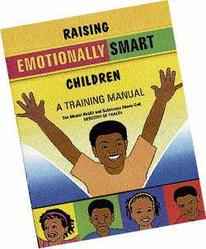
BE WELL - Eulalee Thompson
By age six, your child's young brain, the control centre for behaviour, may have been hard-wired to react in violent ways.
"It's based on the biological process ... what we know is that in the early years, the brain is laying down wires (and) this continues throughout early childhood and (the brain) becomes hard-wired by age five or six," said Dr Earl Wright, psychiatrist and head of the ministry of health's mental health department.
Dr Wright's comment is backed up by research indicating that the first six years of life are the most important ones for the young brain which is hungrily lapping up and storing as much information as it can; information that will influence thought, feelings and behaviour.
Dr Wright said that early in life therefore, parents and caregivers should be teaching children to balance the polarities of the 'emotional and primitive brain' with the 'executive (thinking, rational) brain'. However, he said that too often in Jamaica, emotions overtake 'the thinking brain' and the far too common result is that people are quick to respond to real or perceived acts of insult in violent, angry and destructive ways.
The primitive id
Freud (that famous psychoanalyst), I think, would probably have said instead that Jamaica is 'id country'. The id, that 'primitive', selfish, pleasure-seeking part of the brain is present with us from birth and is pure instinctual, illogical energy.
The id is like a 'spoilt child' doing whatever it wants to and guided only by pleasure. Its 'primitive' behaviour is only tempered by the development of the ego and superego when rational thinking, norms, societal rules, values and other emotions such as shame and guilt are learned.
Rational thinking, norms and values can only be learnt, however, if they are taught and, are today's caregivers equipped to impart these critical lessons to their young ones? Based on reports of increasing acts of violence and indiscipline in schools and the wider society, the answer would have to be 'no'. Emotionally smart children are less likely to use violence as a first response to insult.
Training manual
And on the matter of teaching is where the "Raising Emotionally Smart Children" training manual comes in. The manual was produced by Dr Wright's department and takes up the slack in training of emotional smartness. He said that since emotions are always a part of the decision-making process and affect the way we view ourselves and behave in relationships. (See box for essential skills).
Using various age-appropriate and accessible techniques such as drawing faces, matching feeling faces, and simply spending time to talk with children about their day at school, the training manual encourages adults to engage their young ones in that wonderful world of emotions.
And if you think all this 'feelings talk' is just too mushy, then you are perhaps, someone who would answer, "Ah feel a way" when asked, "How did that make you feel?" You perhaps meant to say something like this, "I felt angry when he stepped on my toes and didn't say sorry." The feeling is 'anger'; learn to identify it and you will be better able to manage it and express it in socially appropriate ways.
eulalee.thompson@gleanerjm.com

The training manual, widely distributed health care facilities, train parents to do a better job of raising their children in an emotionally smart way by focusing on mastery of four essential skills:
Teach children emotional smartness
1
Recognising and identifying feeling (basic feelings are sadness, anger, joy, fear and conflict).
2
Understanding feelings (there are positive and negative emotions in various levels of intensity).

